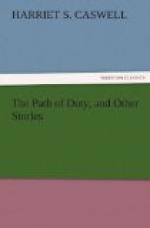so, that he had the ceremony performed without his
father’s knowledge; who afterwards, making a
virtue of necessity, wisely made the best of the matter.
On learning that his son was actually married without
his knowledge, the only remark he made was this:
“What could have induced Ben to cut up such a
caper as to go and get married without my leave; it
must have been the weather, nothing else,” and
as if he had settled the question to his own satisfaction
he was never heard to allude to the matter again.
Years passed away, till one day the tidings reached
us that Uncle Ephraim was dangerously ill. He
grew rapidly worse, and it was soon evident that his
days on earth would soon be numbered. I have
a very distinct recollection of stealing quietly in,
to look upon him as he lay on his dying bed; of the
tears I shed when I gazed upon his fearfully changed
features. He was even then past speaking or recognizing
one from another; and before another sun rose he had
passed from among the living. I obtained permission
to go in once more and look upon him as he lay shrouded
for the grave. I was then a child of ten years,
but even at that early age I had not that morbid terror
of looking upon death, so common among children.
With my own hands, I folded back the napkin which
covered his face, and gazed upon his aged, but now
serene, countenance. There was nothing in his
appearance to inspire terror, and for a moment I placed
my hand on his cold brow. He had ever been very
kind to me, and I regarded him with much affection,
and the tears coursed freely down my cheeks when I
looked my last upon his familiar countenance now lifeless
and sealed in death. I have forgotten his exact
age, but I know it exceeded seventy years. It
so happened that I did not attend his funeral; but
he was followed to the grave by a large number of
friends and neighbours, many of whom still live to
cherish his memory.
STORY OF A LOG CABIN.[A]
[A] I lately came across this sketch in an old Magazine,
bearing the date of 1842, and, thinking others might
be as much interested by it as I was myself, I transcribe
it in an abridged form to the pages of this volume.
It was a dreary day in autumn. Like the fate
which attends us all, the foliage had assumed the
paleness of death; and the winds, cold and damp, were
sighing among the branches of the trees; and causing
every other feeling rather than that of comfort.
Four others and myself had been out hunting during
the day, and we returned at nightfall tired and hungry
to our camp. The shades of night were fast gathering
around us; but, being protected by our camp, with
a blazing fire in front, we soon succeeded in cooking
some of the game we had shot during the day; and as
we ate, the old hunters, who were my companions grew
garrulous, and in turn related their numerous adventures.
“You have lived in Dayton for some time,”
said an old hunter, addressing one of his companions.




